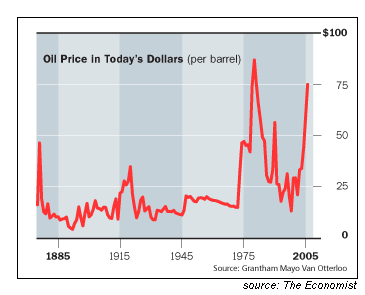

|
| weblog/wEssays | home | |
|
Sugar-Coated Denial (February 7, 2006) The financial press is chockful of glowing stories about how great the U.S. economy is and how wrong the "Bears" are about prospects for a severe decline. Nice, but under inspection the happy stories are built on sand. First up in BusinessWeek's lead story, Unmasking the Economy: Why It's So Much Stronger Than You Think. The basic thesis here is: if intangibles were awarded dollar values, all those pesky deficits would vanish in a rosy glow of rejiggered accounting. For instance, if corporate research and development and investments in education were counted as investments rather than consumption, and if already-educated immigrants' brainpower were counted as an asset, well, tens of billions would be added to the plus side of all those nasty deficits. Say what? Does having smart immigrants and parents paying college tuition suddenly erase $400 billion Federal deficits, or lower the $825 billion current account deficit? This is grasping at straws, a sugar-coating of denial. Yes, R&D contributes to future growth and blah blah blah, but it in no way reduces our dependence on foreign capital or increases our savings or fixes the Medicare nightmare. Putting dollar values on these intangibles does not reduce the unsustainability of the tangibles.  Typical of the Raging Bulls is this "Investor's Soapbox"
contributor in
Barron's Online:
Typical of the Raging Bulls is this "Investor's Soapbox"
contributor in
Barron's Online:
"The secular bear case certainly didn't pan out: consumers didn't collapse out of exhaustion; leveraged corporate balance sheets have been rejiggered; corporate profits, trade flows and international commerce stand at new records; fascinating new-technology product cycles play into globalizing consumer preferences."There's two fallacies at work here: "This time it's different," and "since it hasn't happened yet, it won't happen." What this writer is positing is this: Another contributor to Barron's Online has a more realistic view: "Not helping matters was an upward revision on Treasury's expected borrowing in the first quarter to $188 billion from what was already a massive $171 billion. Given that foreign investors hold over 54% of privately held U.S. Treasuries, yields and the U.S. dollar will be sensitive to developments in the foreign demand for Treasury debt. But, unlike 2003 and 2004, foreign central banks cannot be expected to ride to the rescue, as many already have more-than-adequate levels of foreign reserves and their enthusiasm for U.S. Treasuries has cooled."There is a major cognitive dissonance in the Bull story: if energy amd commodities keep rising, won't those rising prices eventually feed inflation and cause people to consume less oil and copper, gold, etc.? That's what classic supply and demand economics suggests will happen. Yet the Bull case is based on demand being strong no matter how high prices rise. That seems to be a case built on wishful thinking or some other flavor of sugar-coated denial. The Bear case for gold rising forever suffers from a similar disconnect. If gold doubles in price, won't that trigger some fall-off in demand for jewelry, etc.? And won't that lessening in demand cause prices to drop back? Again, the case for ever-rising gold depends on inelastic demand--something which history suggests is unrealistic. People respond to higher prices by using or buying less of whatever has jumped in price. Even oil, the most inelastic demand, can drop by 10% or more once prices dig deep enough into consumer's pocketbooks. Realistic appraisals of our dire straights are seeping into mainstream media. For instance, take a look at this excellent summary from Yahoo Finance entitled Living Hand To Mouth--and Barely Getting By. If this piece doesn't give you pause--well, you're wearing Denial Glasses an inch thick. For a view of the economy which isn't sugar-coated, consider what Jeremy Grantham, Investment strategist for Grantham Mayo Van Otterloo had to say: "Hyman Minsky was a serious economist. His thesis of stability being unstable was not at all mainstream. In fact, he had the good sense to keep writing and rewriting the point for 20 years. There is ironclad logic involved. If you have a wonderful stable world and, better yet, it is growing nicely and nothing is going wrong, you are likely as the years go by to take more risk and more risk and more risk, and the cost of taking it gets less and less because interest rates come down, and you can imagine that people will get carried away into thinking such conditions are permanent and take on record levels of debt. They think conditions will always be safe, they will always be good. And then all it takes is some small event to create instability."Sounds like a precise shorthand description of the global economy today--one without the sugar-coated denial. * * * copyright © 2006 Charles Hugh Smith. All rights reserved in all media. I would be honored if you linked this wEssay to your site, or printed a copy for your own use. * * * |
||
| weblog/wEssays | home |